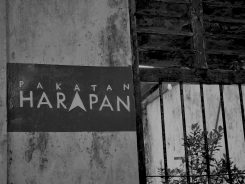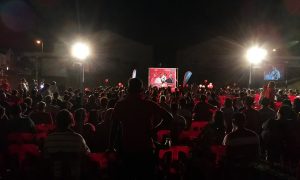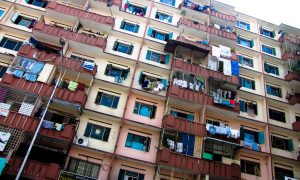As the dust settles on the political machinations from the top that threw Malaysia into unchartered territory – this was the first time since 1969 that the country had no sitting government for close to a week – it is useful to evaluate the political economy that the new Perikatan Nasional government inherits and will have to tackle. Perikatan Nasional takes over this week from the short-lived Pakatan Harapan, which survived for less than two years at the federal government after the latter’s historic defeat of single dominant party Barisan Nasional in 2018. Perikatan Nasional is a new coalition bringing Parti Pribumi Bersatu Malaysia (PPBM, the party that has since left Pakatan Harapan) together with former rivals United Malays National Organisation (UMNO) and the Islamic party PAS. How it handles the country’s already weak economy will determine its own future political stability.
Inheriting an economy of ethnic fault lines
In multiple post-2018 forums discussing the implications of what was then termed as “New Malaysia” one common theme stood out; the country is made up of ‘multiple Malaysias’. What urban middle-class voters failed to grasp was that because different people voted for the Pakatan Harapan for entirely different reasons, their idea of a modern, liberal and open political economy was not necessarily matched with that of their fellow counterparts in the rest of the country. And it is here that the ethnic fault lines that divide the country became even more apparent.
The Merdeka Center for Opinion Research polls post-May 2018 confirm this disparity, where perception towards Pakatan Harapan was consistently higher among non-Malays and lower among Malays. Its popular support fell to an all-time low of 35% in October 2019. Then-opposition parties UMNO and PAS fuelled a narrative that the Pakatan Harapan government was anti-Malay because it was dominated by the Chinese-majority Democratic Action Party (DAP) in its coalition, and insinuated that the government was therefore implementing policies that were unfriendly to low-income Malay households.
Such a perception was in part contributed to by actual policies approved by the Pakatan Harapan government. In its first national budget, dealing with the ramifications of the US-China Trade War and a growing fiscal deficit, in spite of a large dividend from national oil company Petronas, the government decided to halve subsidies to fishermen and farmers. Having abolished the Goods and Services Tax (GST) that it famously campaigned against in 2018, it found itself forced to trim down public spending at the expense of existing social welfare programmes.
Announcements of the civil service being reduced in size, a smoking ban in eateries, cash aid reductions and possibly worse, the appointment of non-Malays into key positions like the Minister of Finance and Attorney-General also contributed to the impression of Malays being undermined. Mega projects like the renewed East Coast Rail Link (ECRL) and Bandar Malaysia in the heart of Kuala Lumpur were renegotiated to plug the fiscal gap. But these came tied with business dealings and financial investments from China, a relationship that many view suspiciously as disadvantageous to Malaysia especially in terms of job opportunities for locals.
Pakatan Harapan’s attempts, but too little too late
To its credit, the Pakatan Harapan government recognised the need to address the lowest-income communities, where the bottom 40% of Malaysians earn less than USD916 a month. Most of these are not saving enough money for the future, if at all. Pakatan Harapan launched a Shared Prosperity Vision 2030 that had some of the right language needed to address the complaints of the rising cost of living, but it was shallow on actual policy. In its 2020 budget, it unveiled a series of programmes targeting those struggling to make ends meet, including affordable housing projects, restoring selected subsidies and targeted cash handouts.
But there may not have been enough time for these programmes to be rolled out sufficiently, and by the Tanjung Piai by-election in November 2019 in Johor, traditionally an UMNO stronghold, voter sentiment against Pakatan Harapan was strong enough that Barisan Nasional won with 65.6% of the vote. This galvanised resolve from UMNO and PAS, then in coalition under the Muafakat Nasional banner, and perhaps more crucially also put pressure on PPBM to implement more pro-Malay socio-economic policies.
The Covid-19 outbreak in January and February this year contributed to an already struggling economy, with retail and food and beverage businesses hit particularly badly as people were encouraged to stay home and avoid crowds. While the Pakatan Harapan government responded by drafting the Economic Stimulus Package 2020 that would roll out tax and cash incentives (for instance, one-off payments to taxi drivers, tourist bus drivers, tourist guides and registered trishaw drivers), it was yet another ‘too little, too late’ programme. Fighting against time while the political crisis was brewing within the Pakatan Harapan coalition, the government collapsed before it had the chance to announce the package and reap the full benefits from such populist measures. Indeed, Mahathir Mohamed went ahead with the announcement as interim Prime Minister on 27 February 2020, the positive impact of which Muhyiddin Yassin is now fortunate enough to enjoy.
Managing the race-based political economy
In his maiden speech as Prime Minister on 2 March, Muhyiddin already made overtures as to the approach he will have, by explicit mention and recognition of what people need: “money to buy daily essentials, children’s books and school material, paying water and electricity bills and home rental, housing and car loans, and other needs for the family.”
The bottom 40 percent – and even the middle 20 percent – of Malaysian society spend the bulk of their disposable income on the essentials that he listed, and ultimately want a “stable, peaceful and prosperous” country. These were words used by the Barisan Nasional government during campaigns, which Muhyiddin knows will send the right signal to the electorate: I will fill your pockets and you will live better lives. Sure enough, results from a YouGov survey report that 59% of low-income communities in Malaysia support the formation of the Perikatan Nasional government. This is compared with 19% of the high-income communities supporting PN.
A new series of perspectives on the “Malaysia Baharu” from Malaysian scholars, activists, and policymakers.
A Changing Malaysia?
Apart from the populist programmes that will likely increase in the form of handouts and more affirmative action policies for the Malay majority, the patronage system long practised by UMNO – and which we saw emerging in the Pakatan Harapan government, particularly in PPBM and to a certain extent, PKR – will surely return.
How does this affect the lowest-income communities, especially in rural parts of the country? It is in the kampung (village) areas that communities are an essential part of life. UMNO had incumbency advantages of having set in place a smooth, well-functioning system where members of the community would depend largely on local warlords for anything and everything, from wedding expenses to odd-job hires, from repairs for flood-damaged roofing to building youth-centred community halls.
During its 50 years in power, when UMNO delivered economic benefits to constituents it claimed credit entirely based on race. By politicizing race, it ensured its own survival as the Malay party that could, and would, provide. This made it difficult for Pakatan Harapan to detach the communities’ dependency, both real and imagined, on UMNO and its local Malay leader representatives. Worse, the communities felt insecure, thinking that these aid packages disbursed through entrenched patronage networks would disappear under Pakatan Harapan. And although an argument can be made that the upper-class urban Malays do not depend as much on these handouts as their relatives in the kampungs do, modern patron-client networks are still an important lifeline for those within the struggling urban and semi-urban poor.
Although partly regulated by its new coalition partners, UMNO will again have unparalleled access to the public resources it had previously used to oil the patronage machinery it did so successfully when in federal government. This will likely unfold in the same manner: the distribution of positions in government-linked companies (GLCs) and scores of other entities, contracts to friendly and supportive companies and jobs in the hundreds of politically-linked companies and those controlled by ministries and GLCs.
Recall that Pakatan Harapan’s earlier clarion calls was to uphold the rights of all Malaysians regardless of race or religion. Pakatan Harapan was later forced to come to terms with the reality of Malaysia’s political economy and in the middle of their short-lived term began to use the same language as UMNO, falling back to tried and tested race-based language and policies. The Shared Prosperity Vision 2030 document emphasizes that bumiputera outcomes (Malays and other indigenous groups) need to be given priority and is systematically embedded in every strategic thrust and enabler. Decoupling race from economic benefit would have been a solution, but one that Perikatan Nasional is unlikely to implement given its ethnic makeup.
“Stable, peaceful and prosperous”
And so, with increased in-fighting within the coalition up to its demise, Malaysians observed an increasingly unstable and weak government. This was made worse by the negative effects of Covid-19 and the trauma of uncertainty over the week in which there was no government in place. Lower down the food chain, the collective effect of this was likely that voters just wanted to carry on making a living, which they may have opined requires a stable political environment.
Here is where the new Perikatan Nasional government may actually thrive. In providing the age-old set of policies, patronage and programmes, it more importantly provides a sense of stability that the Malay majority expect and appreciate. The scale of grand corruption that Najib Razak was revealed to have undertaken was the last straw for many voters in the last general election. But once that element was removed, it is possible that voters will desire a return to what was before. Of course, this will come at a cost; the government will no longer be incentivised to adhere to any form of institutional reforms. This is a pity given that these reforms that would actually revive the slowing economy and provide assurance to investors that the Malaysian economy is open and operates on a level-playing field.
Muhyiddin’s first speech also committed to integrity and good governance, abolishing corruption and improving enforcement. His challenge will be to do this whilst simultaneously maintaining the patronage system that has been perceived to function well for members, supporters and the wider community. Malaysia is already signatory to six regional free trade agreements (with the ASEAN Free Trade Area (AFTA), China, Korea, Japan, Australia, New Zealand and India) and there will be increased international pressure to improve regulation in public procurement and State-Owned Enterprises (SOEs, the more internationally known reference for GLCs). The latter two are areas which are most well-used for patronage purposes, a common practice of single dominant parties the world over.
Perikatan Nasional can choose to stay with the safe policies that allowed Barisan Nasional to rule for over 50 years. The question is whether internal and external pressures will eventually force them – or any government in power – to reform for long-term sustainability, or to carry on with more conservative social and economic measures that it believes will secure votes. More worryingly, will there be a return to authoritarian ways of silencing civil liberties for the sake of providing a stable, peaceful and prosperous nation that can get on with life and earn its keep?
Muhyiddin Yassin has a plethora of challenges ahead. He is under pressure to legitimise his government through a first parliamentary sitting in May, and will struggle to manage the three coalition parties and their competing electoral interests, where each of them cater to the same Malay-majority electorate and will invariably fight for the same seats. If Muhyiddin Yassin survives and can keep Perikatan Nasional together, he will still have to tackle the complex dynamics of Malaysia’s political economy in the months and years to come.
 Facebook
Facebook  Twitter
Twitter  Soundcloud
Soundcloud  Youtube
Youtube  Rss
Rss 



